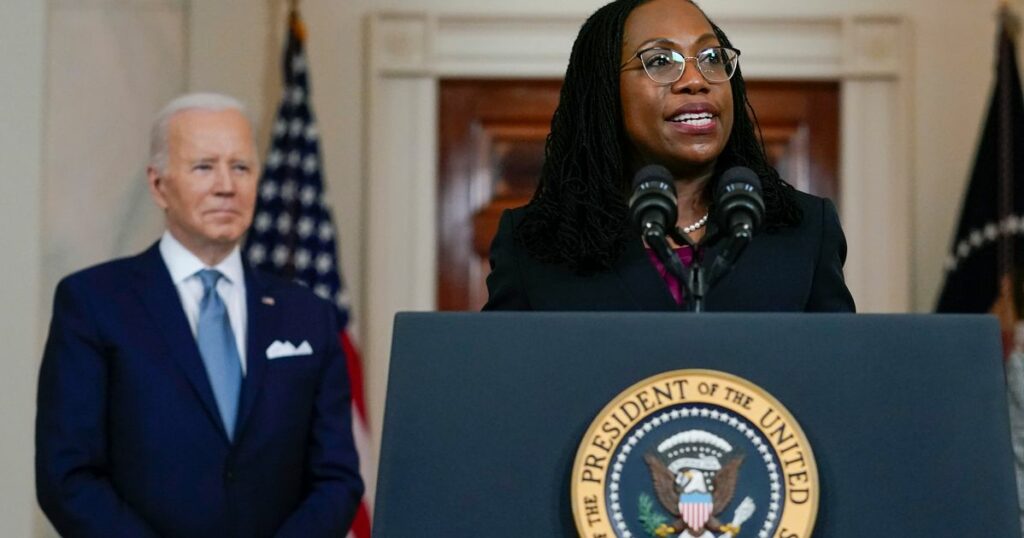via Associated Press
UNITED STATES – This is a big step in the history of the United States. For the first time, an African-American, Ketanji Brown Jackson, has entered the Supreme Court, the highest court in the country.
The US Senate confirmed this nomination by 53 votes in favor (47 votes against), this Thursday, April 7. A first which was greeted by the applause of the American parliamentary chamber, reports ABC Newswhen it was the last step to take before Ketanji Brown Jackson was officially named.
Joe Biden is realizing one of his campaign promises, put on the table after a catastrophic start to the primary and three failures in Iowa, New Hampshire and Nevada. His proposal to appoint a black woman to the Supreme Court had enabled him to win the favor of the African-American electorate in South Carolina, to reverse the trend, to win the Democratic primary and then the presidential election.
In the end, African Americans overwhelmingly voted for him against Republican Donald Trump in November 2020, with 92% of the vote. “This community traditionally votes for the Democrats, recalls Marie-Christine Bonzom, political scientist and former journalist in the United States. But in South Carolina, Georgia, or even in Michigan, their support was decisive. Biden would never have been elected without them.”
Fall in the polls
Since then, the president has disappointed. According to a Yougov poll (below), the president fell from 76.2% positive opinions among African Americans in January 2021 to 67.9% at the end of March 2022, with a low in October 2021, at 65.9%. If we compare with the percentage of votes obtained during the presidential election, it is even a fall of 25 points, points out Marie-Christine Bonzom.
Yougov screenshot
“He lost a lot of support, especially among young people under 35. This considerable fall can be explained by economic reasons: the withdrawal from Afghanistan seen as a failure and badly experienced by many African-Americans in the army, the increase in crime which affects them directly, or even the Covid, disease where mortality is 2.5 times higher for them than for the rest of the population,” she explains.
Among the other reasons for the dissatisfaction are the failures of the electoral reform which aimed to harmonize the rules of voting and thus avoid the obstruction of which they are victims, as well as the bill on the police which wanted to review the rights and training law enforcement to avoid tragedies like those of Breonna Taylor or George Floyd. Both failed to convince congressional lawmakers.
Biden, a default vote
For Marie-Christine Bonzom, this drop in the polls is “not surprising”. “Even before the election, there was a reluctance towards Joe Biden. He is criticized for his racism – during the campaign, he said ‘You are not black if you plan to vote Trump’ -, for his friendships with elected segregationist Democrats or for his support for anti-crime policy in the 1990s, which made minimum sentences tougher.”
Conclusion, “if the majority of black people vote Democrat, there is no enthusiasm for Biden. He was elected because he was not Trump”. This feeling is reflected at the level of the general population: Joe Biden does not even reach 40% of favorable opinions, below the level of his predecessor during the same period of his presidency.
Could the nomination of Ketanji Brown Jackson generate a burst of support, like during the campaign promise? The question arises all the more since the mid-term elections will take place in seven months and a bitter failure of the Democratic Party is already anticipated. “The nomination has been very well received, the opinions are very positive. This is an important step, a first, and it is in no way a favour, she is very qualified”, underlines Nicole Bacharan, co-author of The Great Days That Changed America. An opinion shared by all the experts questioned by the Huffpost.
In the Yougov poll, the announcement of the resignation of Judge Stephen Breyer and his replacement by Ketanji Brown Jackson has also allowed the curve to rise. Since then, progress has been slow but steady. Jean-Éric Branaa, lecturer at Paris-2 University, however, refuses to see a real link. “At the moment there is a rise yes, but it must also be attributed to the Ukrainian crisis and the end of the Covid-19 crisis”, he judges.
The midtermsan announced failure
What about the midterm elections? Another Morning Consult poll for Politico asked the African-American community about their willingness to vote next November. At the beginning of March, 49% said they were “extremely” or “very” excited at the idea of going to the polls, an increase of 8 points since the announcement of the name of Ketanji Brown Jackson on February 25.
Morning Consult screenshot
If Morning Consult sees a link between the two, once again, Jean-Éric Branaa does not want to draw any conclusions too hastily. “This survey asks about the emotion of the moment. I don’t see any correlation there. All surveys on midterms are null and void, we do not even know the candidates for whom we will have to vote”, he explains.
For Marie-Christine Bonzom too, the appointment of Ketanji Brown Jackson will not be decisive: “There will be a small influence, on the margins, a renewed support in the coming days but it will not last until November if the problems economy does not work out. Biden is in limbo for all records.”
Nicole Bacharan shares this analysis. And adds: “The Democrats will highlight this achievement. It might motivate a small portion of the African-American electorate to turn out, but I doubt it will have a big impact.” The debacle of midterms looks tough for Joe Biden.
See also on The HuffPost: One Year After Capitol Storm, Biden Blames Trump




